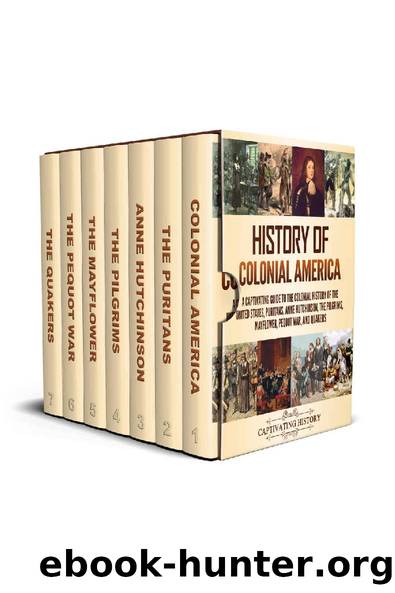History of Colonial America: A Captivating Guide to the Colonial History of the United States, Puritans, Anne Hutchinson, the Pilgrims, Mayflower, Pequot War, and Quakers by Captivating History

Author:Captivating History [History, Captivating]
Language: eng
Format: epub
Published: 2022-01-20T18:30:00+00:00
Chapter 5 â The Expansion of the Colony
Portrait of Governor William Bradford
https://en.wikipedia.org/wiki/William_Bradford_(governor)#/media/File:Williambradford_bw.jpg
The neighbors of the Pilgrims werenât only the Native American tribes: Pamet and Nauset at Cape Code, Wampanoag and Narragansett to the south and west, and Massachusetts to the north. In fact, there were many English fishing villages on the coast of Maine, but they were not permanent. The English fishermen came seasonally and would leave for England with their catch. To the north, in Canada, the hostile French lived, and in the area of what is today Albany, New York, the Dutch set up their trading post. Inland was the territory of the natives, a wilderness the Pilgrims were not daring to explore. Around sixty Pilgrims lived in the Plymouth colony, happy with the abundant first harvest. They were far away from England and were free. They had shelter, food, and the will to call New England their home.
A year after the Pilgrims first set foot on the shore of Cape Cod, a new ship from England arrived. It was sent by the Merchant Adventurers Company, and it carried thirty-seven new settlers. The shipâs name was Fortune, and it came from London under the captainship of Master Thomas Barton. Among the passengers of Fortune were some of the family members of the first Plymouth colonists. William Brewsterâs son Jonathan came, as well as John, the brother of Edward Winslow. The former leader of the Leiden congregation, Robert Cushman, also arrived in the company of his son Thomas. Philip Delano came on board Fortune, as well, and he is known to be the ancestor of President Franklin Delano Roosevelt. The newcomers were accepted without questions, but they did come without any supplies, which put additional strain on the Pilgrims. Not only did the harvest have to be shared among the additional people, but housing, as well.
The ship Fortune didnât just deliver new settlers. With it came some important documents, such as the patent signed by Sir Ferdinando Gorges and the members of the new Council of New England (previously Plymouth Company), in which they had promised the Pilgrims 100 acres of land each provided that they worked for the Company for seven years. Another document was a letter from Merchant Adventurers that scolded the Pilgrims for not signing the contract with their company and urging them to do so now. They threatened that the money and supplies would stop coming from London if the Pilgrims did not sign the contract. Thomas Weston of the Merchant Adventurers also demanded that the Pilgrims pay for the expenses of their voyage, and he bemoaned that the Mayflower returned without any cargo. The Pilgrims did feel guilty for leaving without signing the contract, and after deacon Cushman urged them, they agreed to do so now.
But Governor Bradford wrote a response to Thomas Weston in which he explained how the Pilgrims had worked themselves to death to uphold the contract with the Merchant Adventurers, and he notified Weston of how Governor Carver died. He
Download
This site does not store any files on its server. We only index and link to content provided by other sites. Please contact the content providers to delete copyright contents if any and email us, we'll remove relevant links or contents immediately.
Spare by Prince Harry The Duke of Sussex(5180)
Navigation and Map Reading by K Andrew(5151)
Tuesdays with Morrie by Mitch Albom(4770)
Machine Learning at Scale with H2O by Gregory Keys | David Whiting(4295)
Cracking the GRE Premium Edition with 6 Practice Tests, 2015 (Graduate School Test Preparation) by Princeton Review(4285)
Never by Ken Follett(3937)
Goodbye Paradise(3802)
What It Really Takes to Get Into Ivy League and Other Highly Selective Colleges by Hughes Chuck(3752)
Fairy Tale by Stephen King(3370)
Harry Potter and the Prisoner of Azkaban (Book 3) by J. K. Rowling(3354)
Pledged by Alexandra Robbins(3170)
Kick Ass in College: Highest Rated "How to Study in College" Book | 77 Ninja Study Skills Tips and Career Strategies | Motivational for College Students: A Guerrilla Guide to College Success by Fox Gunnar(3118)
Reminders of Him: A Novel by Colleen Hoover(3095)
A Dictionary of Sociology by Unknown(3077)
Sapiens and Homo Deus by Yuval Noah Harari(3068)
The Social Psychology of Inequality by Unknown(3019)
Will by Will Smith(2911)
Graduate Admissions Essays, Fourth Edition: Write Your Way into the Graduate School of Your Choice (Graduate Admissions Essays: Write Your Way Into the) by Asher Donald(2909)
Zero to Make by David Lang(2778)
